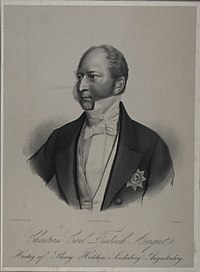Christian, Duke of Augustenborg
| Christian August II | |||||
|---|---|---|---|---|---|
 |
|||||
| Duke of Schleswig-Holstein-Sonderburg-Augustenburg | |||||
| Reign | 14 June 1814 - 11 March 1869 | ||||
| Predecessor | Frederick Christian II | ||||
| Successor | Frederick VIII | ||||
| Born |
19 July 1798 Copenhagen, Denmark |
||||
| Died | 11 March 1869 (aged 70) Primkenau (now Przemków), Kingdom of Prussia |
||||
| Spouse | Countess Louise Sophie of Danneskiold-Samsøe | ||||
| Issue | Alexander, Hereditary Prince of Schleswig-Holstein-Sonderburg-Augustenburg Princess Louise Auguste Princess Caroline Amelie Princess Wilhelmine Frederick VIII, Duke of Schleswig-Holstein Prince Christian Princess Henriette |
||||
|
|||||
| House | Schleswig-Holstein-Sonderburg-Augustenburg | ||||
| Father | Frederick Christian II, Duke of Schleswig-Holstein-Sonderburg-Augustenburg | ||||
| Mother | Princess Louise Auguste of Denmark | ||||
| Religion | Lutheranism | ||||
| Full name | |
|---|---|
| English: Christian Charles Frederick Augustus Danish: Christian Carl Frederik August German: Christian Karl Friedrich August |
Christian August II, Duke of Schleswig-Holstein-Sonderburg-Augustenburg (19 July 1798 – 11 March 1869, Christian Carl Frederik August), usually simply known by just his first name, Christian, Duke of Augustenborg, was a claimant to the rulership of the provinces of Slesvig and Holstein, and the fiefholder of Augustenborg and Sønderborg. He was a prince of the House of Schleswig-Holstein-Sonderburg-Augustenburg and a cadet-line descendant of the Danish royal House of Oldenburg.
He was the eldest son and heir of Princess Louise Auguste of Denmark and Frederik Christian II, Duke of Augustenborg. As such, he was high in the line of succession to the Danish throne. He was the brother-in-law of King Christian VIII and nephew of King Frederick VI.
In 1848, German-nationalist sympathies prompted a rebellion in Schleswig-Holstein against Danish rule. A provisional government was established at Kiel under the Duke of Augustenborg, who travelled to Berlin to secure the assistance of Prussia in asserting his rights. The First War of Schleswig ensued.
However, European powers were united in opposing any dismemberment of Denmark. Among others, Emperor Nicholas I of Russia, speaking with authority as Head of the elder Holstein-Gottorp line, regarded the Duke of Augustenborg a rebel. Russia had guaranteed Schleswig to the Danish crown by the treaties of 1767 and 1773.
...
Wikipedia
